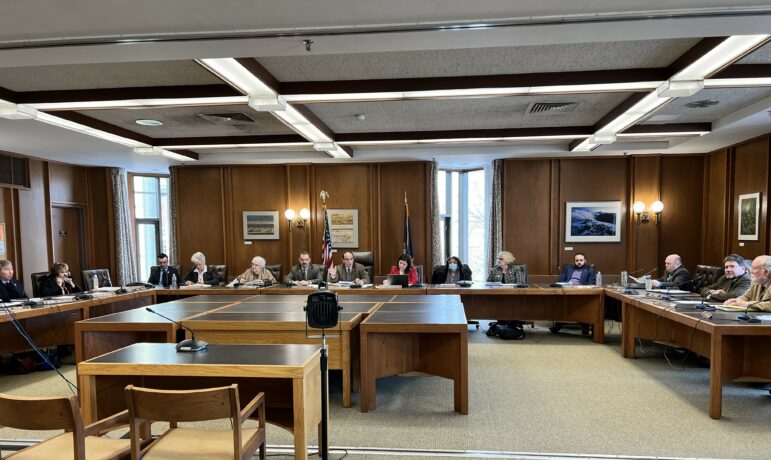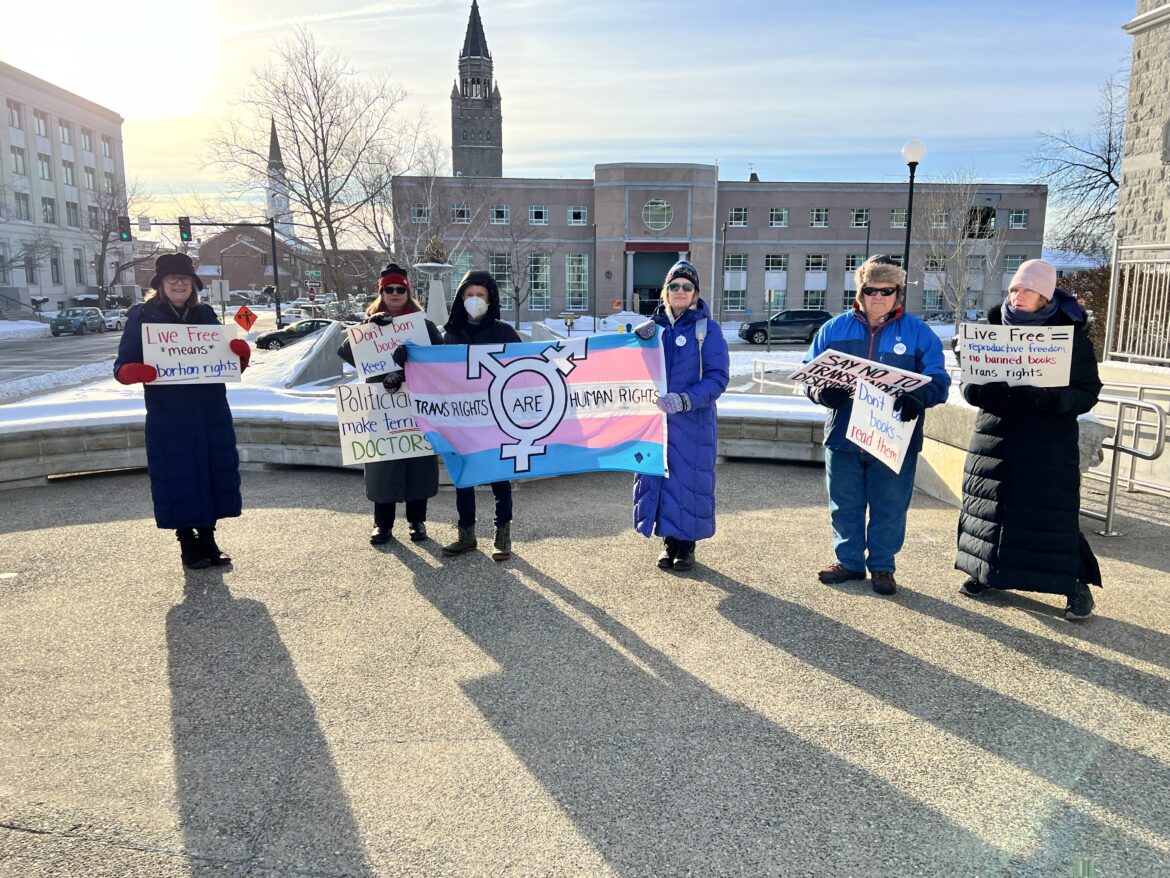
Above, The House Judiciary Committee meets for its Executive Session in Concord Thursday to vote on three abortion bills. ANI FREEDMAN photo
By ANI FREEDMAN, InDepthNH.org
CONCORD – After emotional testimony on January 10 over three bills that would either codify abortion into the New Hampshire constitution or severely limit access, the House Judiciary Committee voted on their recommendations for each bill on Thursday morning.
Two of the three votes were nearly unanimous against passing the 15-day abortion ban and alterations to the current abortion law when they are voted on by the entire House. The committee was tied, however, in its decision to support or oppose the constitutional amendment to enshrine abortion as a right in New Hampshire.
Rep. Katelyn Kuttab, R-Windham, was first to motion inexpedient to legislature, or against, CACR23, which would ingrain abortion into the New Hampshire constitution that “Every individual has a fundamental right to abortion.” Kuttab argued that the majority of New Hampshire citizens would like the law to stay as is today, without altering the constitution.
Rep. Walter Stapleton, R-Claremont, was adamantly opposed to the proposed amendment, citing his “personal, ethical, religious beliefs.”
“Life begins at conception,” Stapleton said.
While Chair Bob Lynn, R-Concord, stated he is pro-choice in abortion rights, he said the amendment as written had issues. The amendment states that abortion should be allowed after 24 weeks, given that an attending physician deems it as medically necessary—a point which both Kuttab and Lynn took issue with.
Lynn further argued that the language allowing “every individual” the right to an abortion may mean that a man could request a woman he impregnates to get an abortion according to this constitutional right. He said the Supreme Court’s decision to overturn Roe v. Wade was the correct one, and New Hampshire should not take the step to incorporate it into the state constitution.
Rep. Marjorie Smith, D-Durham, soon followed with her motion of ought to pass.
“The state should stay out of privacy rights,” Smith said. She believes that the legislature has an obligation to allow citizens to vote directly on whether or not to add abortion into the constitution.
“Each of those votes takes us closer to the people where we are asking them to decide on what could not be more of a private, personal decision,” Smith said.
Rep. Eric Turer, D-Brentwood, supported his Democratic colleague on CACR23, arguing that the right to abortion is what people have come to expect as a constitutional right.
“Our choices about our reproduction really constitute, in terms of the concept of freedom and liberty over our bodies, some of the most deeply held and personal choices that people make in their lives,” Turer said.
Stapleton said that a constitutional amendment would go against the Supreme Court’s Dobbs ruling, which declared that abortion was not a constitutional right. He cited the Constitution’s language of “Life, Liberty, and the Pursuit of Happiness” as central to why this amendment should not be adopted. From Stapleton’s perspective, abortion goes against the right to life.
Both motions of inexpedient to legislate and ought to pass ended in ties across party lines. CACR23 will then go to the House with no recommendation from the committee.
The next two bills, however, established near-total bipartisan consensus in the topic of abortion. The controversial 15-day abortion ban, HB 1248, garnered little discussion from the legislators. Rep. Zoe Manos, D-Stratham, called the bill “draconian.”
“This amounts to outlawing abortion in New Hampshire, forcing women to go out-of-state and delaying necessary and needed care,” Manos said. “This is not what the people of New Hampshire want.”
Rep. Dave Testerman, R-Franklin, is the primary sponsor of the bill, and the only one who voted in support of recommending its passage.
“Fifteen days is, in fact, unreasonable,” Testerman said. “There should not be allowance for an abortion at all.”
The committee voted 19 to 1 against recommending passing the strict abortion ban.
The final bill of the meeting, HB 1541, would require an abortion “performed after viability or 15 weeks gestation to be performed in a hospital with an intensive care unit and in the presence of a second physician.” During the procedure, the physician, under this law, would be required to make “all reasonable attempts to preserve the life of the unborn child.” Failure to comply with such a law would result in criminal prosecution.
Turer motioned to vote against the bill’s passage, declaring it to have “a large number of inconsistent, inaccurate, and conflicting components to it.”
Turer said the bill had several medically inaccurate practices and terms. Rep. Jeffrey Greeson, R-Wentworth, agreed with him. He took particular issue with the language of “viability.”
“A human baby is not supposed to be viable at 15 weeks or 24 weeks,” Greeson said. “When you use the word viability, you are not using a word that means anything.”
The committee again voted 19 to 1 against recommending the bill’s passage, with its only supporter being Testerman, the primary sponsor of HB 1541 as well. Along with the 15-day abortion ban, this bill will move onto the House with recommendation that it does not pass.
Ani Freedman is a contract reporter with InDepthNH.org. She is a recent graduate from Columbia Journalism School with a passion for environmental, health, and accountability reporting. In her free time, she’s an avid runner and run coach. She can be reached at anifreedmanpress@gmail.com.





